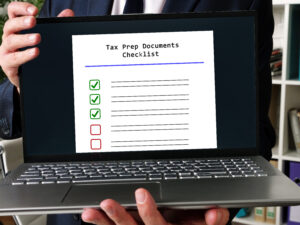Remember that feeling when you see flashing lights in your rearview mirror, even though you’re driving perfectly legally?
That’s how most people feel about IRS audits.
While only a small percentage of tax returns face audits, understanding what catches the IRS’s attention can help you sleep better at night – and keep your tax returns as clean as a whistle.
Let’s explore the red flags that might make the IRS raise an eyebrow (or two).
The Numbers Game:
Mathematical Mismatches

Warnings that can result in an IRS Audit
When 2+2 Doesn’t Equal 4
Think of your tax return as a complex mathematical puzzle – all pieces need to fit perfectly. The IRS computers are like expert puzzle masters, instantly spotting when something doesn’t quite add up. It’s not just about basic math errors (though those certainly don’t help); it’s about consistency across all reported documents.
The Income Reporting Dance
Here’s something that might surprise you: the IRS already knows most of your income before you file. They’re like that friend who always seems to know your secrets. When your reported income doesn’t match their records from W-2s, 1099s, and other official documents, it’s like showing up to a party wearing mismatched shoes – impossible to miss.
The Too-Good-To-Be-True Department
Deduction Red Flags
Deductions are like seasoning in cooking – the right amount enhances everything, but too much ruins the dish. Some deductions that tend to trigger second looks:
- Home office deductions that seem too generous
- Charitable contributions that don’t match your income profile
- Business meals that look more like personal dining
- Vehicle expenses that don’t pass the “reasonable” test
The Round Number Syndrome
Here’s an insider tip: the IRS knows that real life rarely produces perfectly round numbers. When every deduction ends in zero, it’s like telling the IRS you’re estimating rather than tracking actual expenses. Life is messy – your numbers should reflect that reality.
Business Owner Special Alerts
The Cash Business Conundrum
If you run a cash-heavy business, the IRS watches you like a hawk watches a field mouse. They’ve seen every trick in the book and have sophisticated methods to spot unreported income. Think of industry averages as a baseline – if your numbers deviate significantly, be prepared to explain why.
The Home-Based Business Blues
Running a business from home is perfectly legitimate, but claiming huge losses year after year is like waving a red cape in front of a bull. The IRS knows the difference between a genuine business and a hobby masquerading as one.
Lifestyle vs. Reported Income
Living Large on Paper-Thin Income
This is where social media can become your worst enemy. If your Instagram shows you living like a rock star while your tax return suggests ramen noodle dinners, expect some questions. The IRS has entered the digital age – they’re not just looking at numbers anymore.
The Asset Acquisition Mystery
Buying expensive assets while reporting modest income is like wearing a designer suit to claim unemployment benefits – it raises questions. The IRS has sophisticated systems to track major purchases and compare them against reported income.
International Intrigue
Foreign Account Follies
Overseas accounts aren’t illegal, but failing to report them is like trying to hide an elephant under a blanket – it rarely works out well. The IRS has agreements with foreign banks and governments that make international financial transparency the norm rather than the exception.
Cryptocurrency Complications
Think crypto transactions are untraceable? Think again. The IRS is getting better at tracking digital currency movements. Unreported crypto gains are becoming the new offshore accounts in terms of audit triggers.
The Timing Tell-Tales
Last-Minute Filing Madness
While filing extensions are perfectly legal, consistently filing at the last possible moment with complex returns can raise suspicions. It’s like always being the last person to leave a party – people start to wonder what you’re up to.
Amended Return Red Flags
Filing amended returns isn’t inherently suspicious, but file too many and the IRS might wonder why you can’t get it right the first time. It’s like repeatedly asking for a do-over in a game – eventually, people get suspicious.
Professional Responsibility
The Tax Preparer Factor
Your choice of tax preparer matters more than you might think. Using a preparer with a history of questionable returns is like hiring a contractor with a string of lawsuits – you’re asking for extra scrutiny.
Documentation Diligence
Think of tax documentation like a good alibi – the more solid evidence you have, the better. Keep records organized and accessible. Digital storage is fine, but make sure your system is reliable and backed up.
Special Circumstances That Draw Attention
Life Changes and Consistency
Major life changes can trigger extra attention, especially if they significantly impact your tax situation. Marriage, divorce, new business ventures – these are like plot twists in your tax story, and the IRS wants to make sure they make sense.
The High-Income Highway
As your income increases, so does your audit risk. It’s simple math – higher income means more potential revenue for the IRS if mistakes are found. Think of it as being in the fast lane – you’re more likely to attract attention.
Stay Clean, Stay Confident
The key to avoiding audit anxiety isn’t about flying under the radar – it’s about maintaining clean, accurate records and being able to substantiate every claim on your return. Think of your tax return as a resume for your financial life – you want it to be impressive but absolutely truthful.
Remember, the goal isn’t to avoid claiming legitimate deductions or reporting actual income streams out of fear. Instead, focus on accuracy, documentation, and consistency. When you know you’re doing everything by the book, even receiving an audit notice becomes an inconvenience rather than a catastrophe.
Stay organized, be truthful, and keep good records. That way, if the IRS does come knocking, you’ll be ready to answer with confidence rather than concern.





